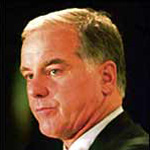By Rob Richie
Published June 17th 2009 in Yes! Magazine
On March 3, the Progressive Party’s Bob Kiss was re-elected mayor of Burlington, Vermont, in the city’s second instant runoff voting (IRV) election. The election not only showcased a more democratic way to elect our leaders, it affirmed two clear trends emerging in the growing number of IRV elections around the country: a civilizing impact on campaign discourse and a weakening of big-money politics.
The Burlington election provided a good example of how IRV works. Under IRV rules, voters indicate a first choice, but also can indicate their second, third and remaining choices. Four strong candidates each earned more than 10 percent of first-choice rankings. Republican Kurt Wright led with 33 percent and Kiss was in second place with 29 percent.
In the instant runoff to determine the majority winner, the candidates with the fewest votes were dropped, including Independent Dan Smith and Democrat Andy Montroll. With the field narrowed to two candidates, the ballots were recounted. Voters whose first choice was Wright or Kiss had their votes count for that candidate. Supporters of the eliminated candidates had their votes count for whichever of the remaining candidates they ranked higher. Kiss won with 51 percent by earning more support from Smith and Montroll supporters.
Burlington’s candidates participated in forums across the city, and, thanks to IRV, spent little time attacking each other. Attacks tend to be counterproductive if the candidate you attack loses early in the count and that candidate’s backers punish you by ranking other candidates higher on their ballots. Negative attacks still take place, but IRV promotes more positive, substantive campaigns where candidates try to earn first choice support against several opponents while still being attractive as a second choice to backers of other candidates.
The Burlington election certainly was a model of clean, open debate. Democratic city councilor Bill Keogh, a past skeptic of IRV, told the local daily newspaper, “This campaign has been very, very good.” The four leading candidates had been “as forthright as they can be with their views,” he said. “This is the most respectful and informative campaign in Burlington in a long time.”
Just as in his initial upset win in 2006, each of Kiss’ main opponents outspent him, including Wright, who spent twice as much. In typical races with only two viable choices, huge amounts of money get spent on negative campaign ads, but those ads are less effective when voters have more choices and candidates have more incentives to reach out to backers of other candidates. That has certainly been the case in San Francisco, which has used IRV for city elections every November since 2004. Numerous highly competitive races have gone to candidates who were outspent, including several progressive candidates targeted by downtown business in the 2008 elections. Today the city’s governing body is more representative than ever, with four white members, three Asians, two Latinos, one African American, and one Persian.
Our complex times demand more candidates able to present diverse views in debates and to gain voter support based on ideas, rather than attacks and slogans. Campaigning respect and civility would be an added bonus of IRV for Americans shell-shocked by the stream of negative attacks that so often permeate modern politics.
The Burlington election provided a good example of how IRV works. Under IRV rules, voters indicate a first choice, but also can indicate their second, third and remaining choices. Four strong candidates each earned more than 10 percent of first-choice rankings. Republican Kurt Wright led with 33 percent and Kiss was in second place with 29 percent.
In the instant runoff to determine the majority winner, the candidates with the fewest votes were dropped, including Independent Dan Smith and Democrat Andy Montroll. With the field narrowed to two candidates, the ballots were recounted. Voters whose first choice was Wright or Kiss had their votes count for that candidate. Supporters of the eliminated candidates had their votes count for whichever of the remaining candidates they ranked higher. Kiss won with 51 percent by earning more support from Smith and Montroll supporters.
Burlington’s candidates participated in forums across the city, and, thanks to IRV, spent little time attacking each other. Attacks tend to be counterproductive if the candidate you attack loses early in the count and that candidate’s backers punish you by ranking other candidates higher on their ballots. Negative attacks still take place, but IRV promotes more positive, substantive campaigns where candidates try to earn first choice support against several opponents while still being attractive as a second choice to backers of other candidates.
The Burlington election certainly was a model of clean, open debate. Democratic city councilor Bill Keogh, a past skeptic of IRV, told the local daily newspaper, “This campaign has been very, very good.” The four leading candidates had been “as forthright as they can be with their views,” he said. “This is the most respectful and informative campaign in Burlington in a long time.”
Just as in his initial upset win in 2006, each of Kiss’ main opponents outspent him, including Wright, who spent twice as much. In typical races with only two viable choices, huge amounts of money get spent on negative campaign ads, but those ads are less effective when voters have more choices and candidates have more incentives to reach out to backers of other candidates. That has certainly been the case in San Francisco, which has used IRV for city elections every November since 2004. Numerous highly competitive races have gone to candidates who were outspent, including several progressive candidates targeted by downtown business in the 2008 elections. Today the city’s governing body is more representative than ever, with four white members, three Asians, two Latinos, one African American, and one Persian.
Our complex times demand more candidates able to present diverse views in debates and to gain voter support based on ideas, rather than attacks and slogans. Campaigning respect and civility would be an added bonus of IRV for Americans shell-shocked by the stream of negative attacks that so often permeate modern politics.
 On March 16th, Former Vermont Governor and Democratic National Committee Chair Howard Dean continued his support for instant runoff voting on Vermont Radio's Mark Johnson Show. Commenting on Burlington's recent IRV election, Dean said "I think the best and most democratic way to use to elect people in multiparty elections is instant runoff voting." Dean also supported the system when it was first used in Burlington in 2006.
On March 16th, Former Vermont Governor and Democratic National Committee Chair Howard Dean continued his support for instant runoff voting on Vermont Radio's Mark Johnson Show. Commenting on Burlington's recent IRV election, Dean said "I think the best and most democratic way to use to elect people in multiparty elections is instant runoff voting." Dean also supported the system when it was first used in Burlington in 2006. Citizens of Burlington, Vermont went to the polls on Tuesday, March 3rd to vote for the second time in an election using instant runoff voting. At 8:25 PM, the city declared that incumbent Mayor Bob Kiss had won reelection in the third and final round of counting, narrowly edging out challenger Kurt Wright, 51.5% to 48.5%. The race was unique in that it had four candidates that had a legitimate shot at winning: Progressive Kiss, Republican Wright, Democrat Andy Montroll, and independent Dan Smith. In most other American cities, there would be fear of "spoiler" candidates, but IRV allowed all four candidates to run without having to worry about being labeled "spoilers."
Citizens of Burlington, Vermont went to the polls on Tuesday, March 3rd to vote for the second time in an election using instant runoff voting. At 8:25 PM, the city declared that incumbent Mayor Bob Kiss had won reelection in the third and final round of counting, narrowly edging out challenger Kurt Wright, 51.5% to 48.5%. The race was unique in that it had four candidates that had a legitimate shot at winning: Progressive Kiss, Republican Wright, Democrat Andy Montroll, and independent Dan Smith. In most other American cities, there would be fear of "spoiler" candidates, but IRV allowed all four candidates to run without having to worry about being labeled "spoilers." On April 4, Vermont governor Jim Douglas chose to veto legislation to re-establish majority elections for Congress in his state through instant runoff voting. Vermont would have been the first state to enact IRV for Congress; legislative leaders affirmed their commitment to the bill, and it is sure to move in the state again. FairVote has worked hard to support this legislation, which likely generated more than 600 phone calls to the governor from Vermonters.
On April 4, Vermont governor Jim Douglas chose to veto legislation to re-establish majority elections for Congress in his state through instant runoff voting. Vermont would have been the first state to enact IRV for Congress; legislative leaders affirmed their commitment to the bill, and it is sure to move in the state again. FairVote has worked hard to support this legislation, which likely generated more than 600 phone calls to the governor from Vermonters.